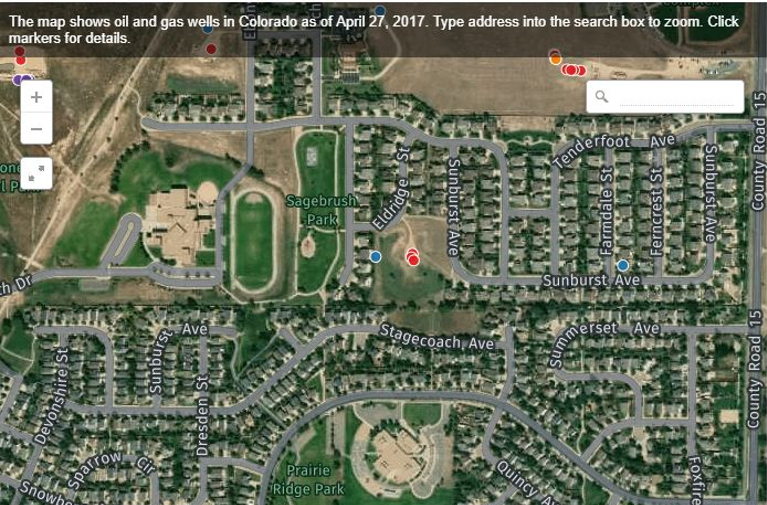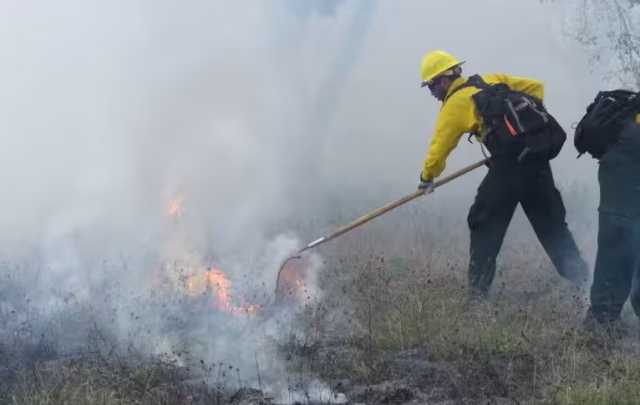As Colorado gears up for another fight over oil and gas drilling near homes and schools, this time the fossil fuel industry is reportedly doing whatever it takes to win.
In the latest flare-up, the oil and gas industry used a website to single out individual journalists for criticism. At the same time, pro-industry protesters were reportedly shadowing canvassers who were gathering signatures to get a measure — Initiative 97 — on the November ballot that would increase the distance between drilling sites and homes.
Colorado Rising, the anti-fracking group behind the ballot initiative, issued a statement last week claiming “harassers were paid to intimidate petition circulators and discourage voters from signing” the petition to get the initiative on the ballot.
Anne Lee Foster, a Colorado Rising volunteer, told Colorado Public Radio that an anonymous employee at Anadarko Petroleum shared an internal document that appeared to ask employees to report when they see Initiative 97 canvassers. The letter includes an email address and a text message hotline, Foster said.
Anadarko had not returned a request for comment from ThinkProgress at the time this article was published.
With huge reserves of oil and gas and an active environmental and clean energy movement, the state often finds itself at the center of the nation’s fossil fuel wars. Oil and gas companies have increasingly been moving into suburban and urban areas of Colorado in search of new drilling opportunities; at the same time, suburban sprawl is colliding with oil and gas fields as housing developers build new communities north of Denver.
Given the huge amounts of money on the line, oil and gas companies have ratcheted up their efforts to prevent the creation of regulatory roadblocks that could stop them from accessing more densely populated areas.
Under the proposed initiative, the current 500 foot setback for oil and gas development would be expanded to a minimum of 2,500 feet. The organizers of the ballot initiative campaign cite public safety and health as the primary reasons for expanding the setbacks.
They point to an April 2017 explosion in Firestone, Colorado — about 30 miles north of Denver — that killed two people at a home located about 200 feet from a natural gas well operated by Anadarko. According to a Denver Post investigation, in the eight months following the Firestone explosion, at least a dozen explosions and fires have been associated with oil and gas facilities along Colorado’s Front Range.
Low-income communities of color in Colorado have also fought against drilling efforts along the Front Range.
In the wake of such accidents, the oil and gas industry and its political supporters typically call for investigations and a temporary shut down of operations. But they remain steadfast in the belief that the economic benefits of drilling, even in more heavily populated regions of Colorado, outweigh the industry’s risks.
In a fiscal analysis of the initiative, the secretary of state’s office said the greater setbacks will reduce oil and gas development in Colorado, leading to less oil and gas employment, reduced rent and royalty income for mineral owners, and reduced profits for oil and gas producers.
For homeowners, the fiscal analysis found that the increased setback distance may preserve property value for homeowners most affected by the setback and “to the extent less development improves health outcomes for affected residents, may increase productivity and reduce medical costs.”
In its analysis of the proposal, the Colorado Oil and Gas Conservation Commission, a state regulatory agency, estimated the initiative would bar oil and gas extraction on more than 85 percent of the state’s non-federal lands.
As activists were gathering signatures for Initiative 97, a new pro-fracking website, called the Energy Accountability Project, was launched, with its “About Me” page explaining the site was “sponsored by energy interests.” But after a Denver television station ran a news report on the website on August 8, the Colorado Oil and Gas Association, an industry trade association, contacted 9News to announce it was the entity behind the website.
Prior to the report, visitors to the website could sort through the industry group’s critiques of the news media by journalist. Even the names of behind-the-scenes producers, whose names and faces aren’t known to the public, were included on the drop-down menu, 9News reported.
After the news story ran, that sorting element of the website was fixed, COGA spokesperson Scott Prestidge said Thursday in an email to ThinkProgress. “At no point was a ‘dossier’ being collected on anybody,” he added.
— Next with Kyle Clark (@nexton9news) August 9, 2018
“We were asked by 9News this week if the Colorado Oil & Gas Association was supporting this website, and we said yes. Whenever anyone asked, we said yes. We should have been forthcoming with that at the beginning,” Dan Haley, president and CEO of the Colorado Oil and Gas Association, said in statement posted on the Energy Accountability Project’s website last Thursday.
Haley explained that the website was established because “too often lately, we find reporters and elected leaders rely on activist studies, misrepresentations, and one-sided arguments for their coverage, and many times they are not responsive when we seek corrections or opportunities to tell our side of the story.”
Energy In Depth, a project of the Independent Petroleum Association of America, boasts a similar mission, but on a national level, serving as a rapid response site that offers critiques of journalists and anti-fracking activists.
Activists submitted 171,000 signatures to the Colorado secretary of state on August 6 for what they are calling the Safer Setbacks from Fracking initiative. The organizers needed to gather about 98,500 valid voter signatures to get the initiative on the ballot.
In a separate ballot initiative, the farming and energy industries want companies and individuals to be compensated if new regulations devalue their property. The groups reportedly spent $1.2 million on signature gathering for the initiative. The measure’s supporters were required to gather signatures from all 34 Colorado state senate districts because — unlike the fracking setback initiative — the “takings” measure would amend the state constitution.
Gov. John Hickenlooper (D), generally a supporter of the state’s oil and gas industry, said he opposes both ballot measures.
The secretary of state has 30 days to review the petitions, giving the state officials until September 5 to let the organizers known whether it is sufficient to appear on the ballot.
Teaser photo credit: Colorado Rising website.





